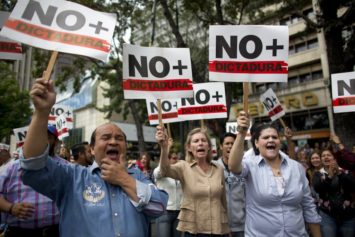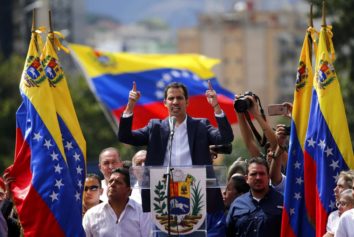After a two-year battle with cancer, Venezuelan President Hugo Chavez died from the disease at 4:25 p.m. local time, Vice President Nicolas Maduro announced to his countrymen and women this evening.
Chavez recreated Venezuela in his own image during his 14-year reign, running his oil-rich nation with such a dominant presence that the term “Chavista” was coined to describe his socialist-inspired political philosophy. He leaves his nation with many questions about who will now take the reins. In the streets of Caracas, there was heartache and fear.
With his voice breaking and tears flowing, Maduro, Chavez’s best friend and closest confidant, announced on television that the leader died “after battling hard against an illness over nearly two years.”
While Maduro didn’t say what killed Chavez, the government had announced just the previous night that a new respiratory infection had severely weakened him.
Maduro asked Venezuelans to be “dignified inheritors of the giant man.”
“Let there be no weakness, no violence. Let there be no hate. In our hearts there should only be one sentiment: love. Love, peace and discipline,” he said.
“I feel a sorrow so big I can’t speak,” Yamilina Barrios, a 39-year-old clerk who works in the Industry Ministry, said tearfully to The Associated Press.
“He was the best this country had,” she said as she wept. “I adore him.
“I hope the country calms down and continues the work that he left us, continues in unity and the progress continues,” Barrios said.
Since returning to Caracas from Cuba two weeks ago after his fourth cancer surgery, Chavez had been stashed away in a tightly guarded suite at a military hospital. During that time, the opposition had grown increasingly vocal about the state of the country’s leadership.
The constitution does say that if the president were to die or had to step aside, presidential powers should be held temporarily by the president of the National Assembly, Diosdado Cabello, and new elections should be held within 30 days.
Before he left Venezuela, Chavez gave a speech in which he said he may not be able to serve his fourth term because he had to undergo surgery and treatment. He pleaded with the populace to choose Maduro, 52, a former bus driver, as his successor.
If “some circumstance” should prevent him from completing his term or starting his next one,” Chavez said, Maduro should not only complete his current term but also be elected president to replace him. “In my firm, irrevocable, absolute and total opinion,” Chavez said. “This I ask you from the heart.”
Maduro has been a close friend of Chavez’s for 20 years — he was among the tiny circle who originally accompanied the president to Cuba for the cancer operation. Genial and well-liked, Maduro is considered a more moderate force in the Socialist regime than many other hard-liners.
But there have been polls indicating Henrique Capriles would beat any Chavez-picked candidates. During the October election, Chavez won 54.4 percent of the vote, compared with 45 percent for Capriles, the Miranda state governor.
The Chavez regime accused Capriles of running a U.S.-style marketing campaign for the presidency. Capriles charged that the country’s high murder rate — 50 homicides per 100,000 inhabitants in 2011 — was evidence of the president’s poor handling of crime.
Before Chavez died, many observers wondered whether his political regime would continue after his death.
“The Chavista legacy will come to an end as soon as he is incapacitated or dies,” Riordan Roett, head of Latin American studies at Baltimore’s Johns Hopkins University, told the Wall Street Journal before Chavez died. “It will be difficult for his band of cronies to maintain the charisma Chavez has created since 1999. They are a humdrum lot.”
Others say that Maduro, running on the memory of Chavez, might have a chance, especially if oil prices stay high. Oil accounts for one-third of the country’s annual economic output, three-fifths of government revenue, and 90 percent of export revenue.
“In principle, we think the latest developments get the opposition closer to power and the market will get its long-awaited ‘regime change,’ ” Nomura Investment Bank said in a note to clients. “However, we think that the market should temper its enthusiasm in the medium term. First, we would not underestimate the emotional aspect of the Chavismo trying to fulfill its leader’s last wish to hold on to power.”


